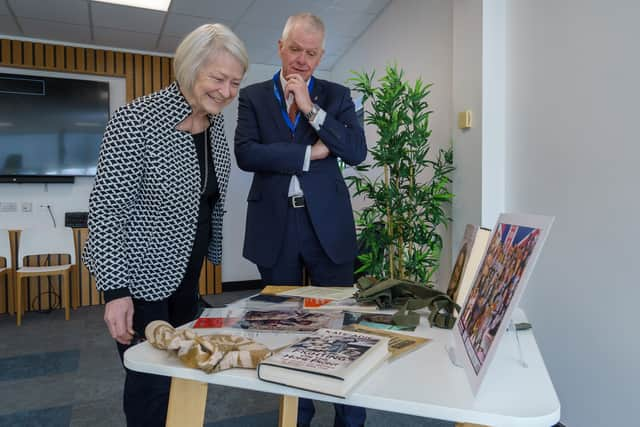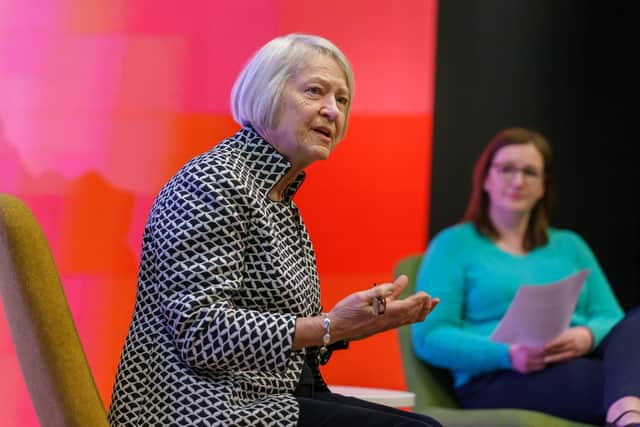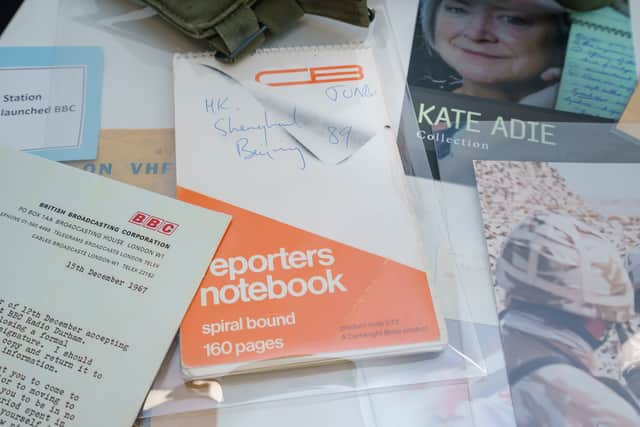World famous Sunderland journalist Kate Adie to see collection of her life's work curated at city's university
and live on Freeview channel 276
World renowned journalist Kate Adie, who grew up in Sunderland, is to have her life’s work catalogued and archived as part of a specially curated collection in her home city.
From her coverage of the Iranian Embassy siege in 1980 to both Gulf Wars, Kate donated her archive of notebooks, tapes, letters, pictures, video and even fan mail, to the University of Sunderland to preserve a record of her professional career. Kate's collection, which chronicles her time working for the BBC, is now set to be "unlocked for future generations" thanks to funding from Archives Revealed - a grant issued by the National Archives to "assess significant and unknown collections that may be of public value". The funding supports the employment of dedicated Project Archivist, Dr Ellie Clewlow, for 12 months, whose work will unlock the Kate Adie Collection for future teaching, learning, research and the wider community.


Advertisement
Hide AdAdvertisement
Hide AdThe collection covers Kate’s trailblazing career at the BBC from 1968 onwards: her early years working at local radio in Durham and Bristol, her coverage of the student uprising in Tiananmen Square in 1989, and her appointment as the BBC's chief news correspondent, a role which lasted until 2003.
During that time, Kate covered a raft of major world events and reported from several combat zones including the Gulf and the former Yugoslavia. Kate said: "It was enormous fun to dig back through the attic where I also found all sorts of memorabilia about Sunderland.
"Everything from old news photos and old prints of the city, and things surrounding my childhood, including two fragments of a bomb which fell in the back of my adoptive parents’ house during World War II.
“The city has a wonderful history and growing up in cities like Sunderland does shape you, it makes you the person you are. Sunderland shaped me. It is all to do with where I come from, and I feel very strongly about that.”


Advertisement
Hide AdAdvertisement
Hide AdKate gave her collection to the University in 2005 on 'indefinite loan', at a time when the University’s Special Collections were in their earliest stages of development, and she also continues to add material to the collection. As part of the curation process, the University will also embark on a programme of engagement activity promoting the Kate Adie Collection to a wide audience.
University of Sunderland Vice Chancellor Sir David Bell said: "Kate Adie is one of the most talented journalists and broadcasters of her generation, and a well-known face to millions of people around the world.
"As a native of Sunderland, her collection of materials will be of interest locally as well as much further afield.
“We believe that Kate’s collection is a unique example of its type within the UK. It is extensive in its breadth and richness of content and includes a variety of written and audio-visual materials relating to some of the most significant events of the 20th and 21st century.
Advertisement
Hide AdAdvertisement
Hide Ad"For that reason, we are delighted to be showcasing it here at the University of Sunderland.”


Jack Butterworth, Head of Grants and Funding at The National Archives, added: “Archives Revealed is delighted to support the University of Sunderland in its project to catalogue the records of Kate Adie’s pioneering career.
"Our funding ensures that significant archival collections are made accessible for research and enjoyment, and this project will make records, including field notebooks, photographs and news clips of Kate Adie’s trailblazing career in journalism, accessible for the first time.
“We are proud to be supporting archives in the North East, and particularly to be unlocking a collection with such strong ties to the institution and community in which it will be held.”
Further information, including how to view the collection, can be found on the University of Sunderland's website.
Comment Guidelines
National World encourages reader discussion on our stories. User feedback, insights and back-and-forth exchanges add a rich layer of context to reporting. Please review our Community Guidelines before commenting.